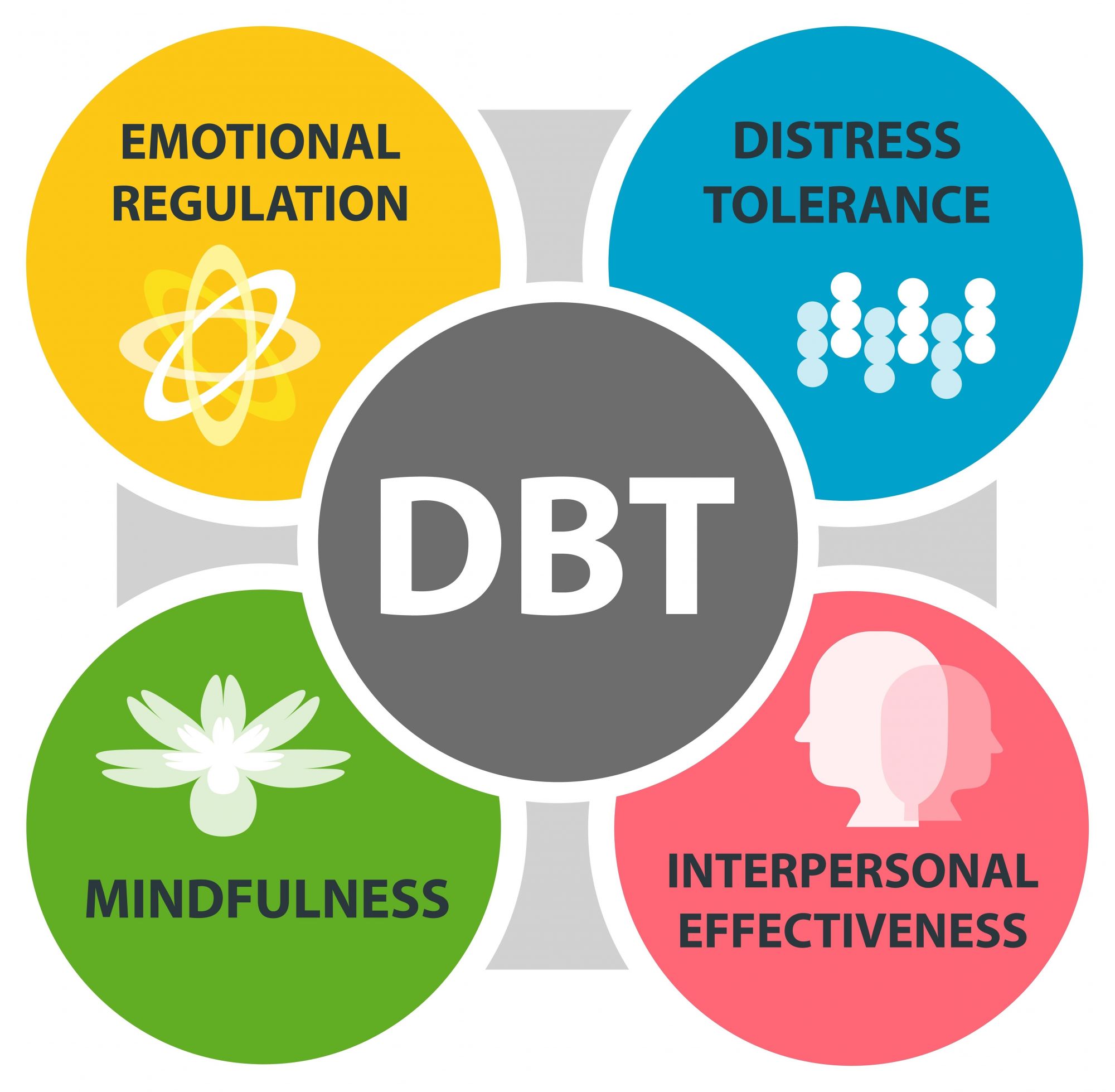What is Dialectical Behavioral Therapy (DBT)?
Dialectical behavior therapy (DBT) is based on cognitive behavioral therapy (CBT) and is a type of talk therapy (psychotherapy) that is specially designed for individuals with very intense emotional perception. Treatment is centered on resolving opposites – dialectical refers to opposing forces – such as the acceptance that comes with validation of experiences and behaviors and the simultaneous need for positive change and forward progression.
The goal of DBT is to help a person understand how their thoughts are affecting their emotions and behaviors. Once difficult feelings can be understood and accepted, skills can be learned that will help to manage and regulate them. DBT has successfully been used to treat and manage a range of mental health conditions and generally strives to teach individuals healthier ways to cope with their strong negative emotions.

Therapeutic skills will be taught using these four core principles:
- Mindfulness
- Distress Tolerance
- Interpersonal Effectiveness
- Emotion Regulation
How can DBT help people with substance use disorders?
Dialectical behavioral therapy is incorporated with our Substance Use Disorder Partial Hospitalization Program (SUD PHP), along with the 12-step program. Individuals who deal with intense emotions often find themselves in a feedback loop, reinforcing negativity and not directly dealing with their difficult feelings. They may not realize it, but they can easily drive themselves deeper into the world of a substance use disorder.
Dialectical behavior therapy (DBT) can help those committed to addiction recovery by allowing them to better understand the whys behind the feelings that have led them to substance use. DBT can help patients to slow down and increase focus so that they can accept the cause of their negativity and better control their reaction to it. Part of understanding one’s addiction is acknowledging outside factors that will make recovery more difficult and working to avoid those. That may include finding environments and peer groups that actively discourage substance use, and removing triggers for use, such as drug paraphernalia or unhealthy personal relationships.
Positive reinforcement is also vital. The DBT program helps to boost a patient’s self-esteem and confidence during difficult periods of recovery, which can help them to stay sober longer. The communication skills and coping skills learned are also game-changing and can turn the tide toward recovery. When armed with the necessary know-how, patients can treat potential relapse as a problem to solve, and focus their energy on finding a solution.
Observed benefits to patients enrolled in a DBT program include:
- Decrease in substance use and physical withdrawal symptoms
- Decrease in impulsivity, cravings, and the feeling of temptation
- Increased ability to create and enforce boundaries
- Increased avoidance of triggers
- Increase in healthy relationships and positive community-building
What does DBT involve?
DBT may include individual therapy and group skill training at our Ohio addiction recovery center, as well as telephone crisis coaching. Participants can expect to meet for group meetings weekly, alongside their individual hour-long therapy sessions. Group meetings typically include 4-10 people and can last up to 2½ hours. The focus is on the present and how participants can utilize newly-learned skills in their everyday lives–they are asked to practice skills between sessions and should expect specific homework assignments.
How long does DBT last?
After 24 weeks, the skills curriculum is completed, and it is often repeated to make up the full year of treatment. This therapy can be difficult and may not work for everyone, but for many individuals it reduces negative symptoms and hospitalization incidence. A commitment to positive change can help an individual to make it through the therapy period and focus on a better present and future. Standard DBT programs include a commitment from participants of involvement for at least a year. The goal of DBT is to move from a place of desperation and misery toward a place where a client can find self-respect, peace, happiness, and even spiritual fulfillment.
Work With Lake Area Recovery Center
At Lake Area Recovery Center (LARC), we understand that overcoming behaviors and habits can be difficult, but we also know that this is essential for addiction recovery. Understanding how negative thoughts are affecting emotions and behaviors is the first step. That is why you need a supportive addiction treatment center, like LARC in Ashtabula, Ohio, to help you pair that knowledge with learned stress management techniques, which will allow you to support a healthy mind and work toward preventing relapse.
Please know that your situation isn’t hopeless–recovery and growth are possible. If you find yourself in a situation where your intense thoughts and emotions make it hard to deal with daily life and are contributing to substance use, reach out to our team to learn more about the dialectical behavior therapy program, or to get more information about our addiction treatment center and drug and alcohol rehabilitation centers in Ohio.
